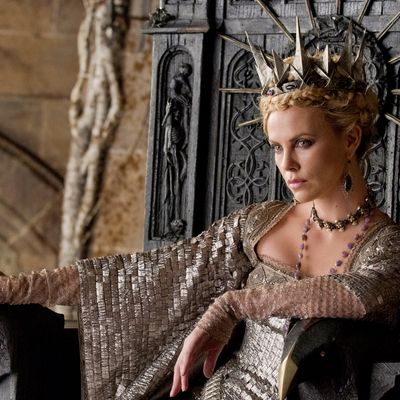
When a friend’s little daughter became upset recently watching the beauteous Buttercup in the fun 1987 mock fairy tale The Princess Bride do little to help the hero slay the Rodent of Unusual Size, I realized we’d crossed a bridge: Damsels in distress can no longer be rescued by handsome men, at least until they’ve proved they can rescue themselves. Snow White and the Huntsman, the latest adaptation of one of the Brothers Grimm’s most beloved fairy tales, is not your father’s Snow White — and, more to the point, not your Uncle Walt’s. Nightmarishly brutal, set against wintry landscapes and medieval battlements, and rife with hopeless, starving peasants, it’s practically a full-bore horror picture, reminiscent of Game of Thrones, Joan of Arc, and Countess Dracula — the one where the title character, inspired by Elizabeth Bathory, stays youthful by bathing in the blood of young women. It’s also strongly influenced by a lot of smart, feminist thinking about why Snow White has so much staying power — and why the story is better when it’s the heroine who slays the monstrous matriarch.
The theme is spelled out in the opening scenes, in which Queen Ravenna (Charlize Theron) slaughters her newest king in bed while hissing that for women, who have been historically subjugated, “beauty is power.” Everything Ravenna has depends on her looks, and the ultimate judgment is delivered in the male voice of a golden-molten mirror that takes near-human form. In the first Grimm version, the Queen was Snow White’s mother, rather than her stepmother — the brothers altered it when they realized it was too close to the bone for their audience. But the hatred here is still primal. Ravenna’s jealousy of Snow White (Kristen Stewart) isn’t presented as mere vanity. She wants literally to devour the girl’s heart, the corollary to putting an infant to the breast in the mind of a mother perverted by the world of men. Nature itself is sucked dry by the Queen’s thirst for beauty.
Kristen Stewart is not an obvious choice for Snow White, given her habitual expression of discomfort while striking conventional feminine poses — both in movies and on red carpets. That’s why, of course, she’s right for this Snow White, imprisoned in a tower during puberty and with no regard for her looks: She has integrity, inner beauty. “How do I inspire? How do I lead men?” she asks the Huntsman (Chris Hemsworth), a grief-stricken drunk who teaches Snow White how to stab her opponents by using the weight of their onrushing bodies against them. She’s not a barrel of laughs, but then, unlike recent fractured fairy tales such as Tangled and the campy Mirror Mirror, Snow White and the Huntsman doesn’t have a single (intentional) laugh. The language is high-flown, the cast unsmiling. It’s a shock when the dwarves (there are eight and they don’t sing) debate killing Snow and the Huntsman (“Skewer him, leave her to rot!”), and a bigger shock when we recognize some of their faces: “What the hell, it’s Ian McShane, Ray Winstone, Eddie Marsan, Toby Jones, Nick Frost, and Bob Hoskins, on little bodies! How’d they do that?!”
Director Rupert Sanders comes from the world of commercials and Xbox games: He’s good with images and not good at all at making them flow together, which means lots of choppy swordplay and tacky slow motion. But the movie’s revisionist tone is startlingly enough to carry you along. The goddessy Theron is a thrilling sight in designer Colleen Atwood’s raven cloak. The actress has no middle register, either declaiming mightily (in close-up) or turning quiet and desolate as wrinkles spread over her face — as they’re apt to do before her next infusion of youth. Stewart’s Snow knows Ravenna is more to be pitied than skewered. Maybe for that reason she’s the first Snow White not to end up in a clinch with her prince, happily indifferent to the verdicts of men or mirrors. You can almost hear her future mother-in-law: “She doesn’t cook, she doesn’t clean …”
This review originally appeared on nymag.com.


